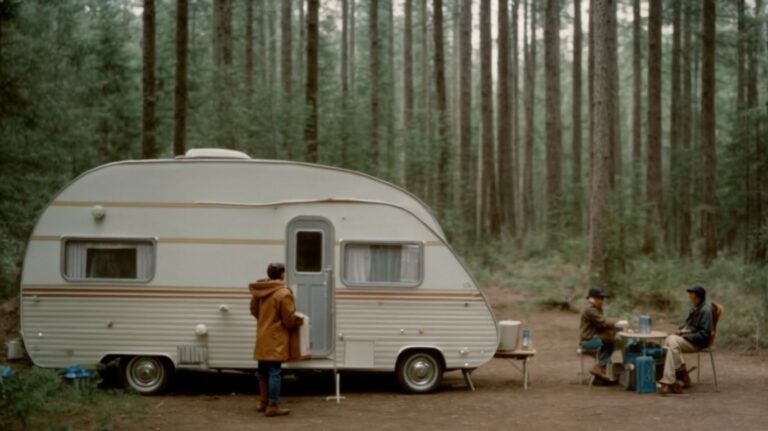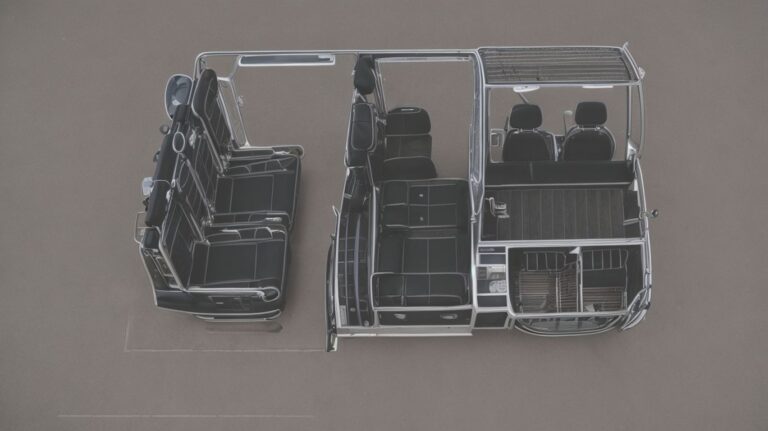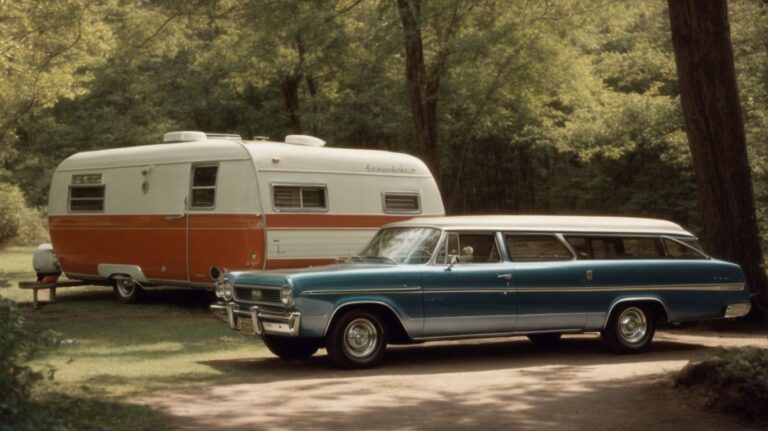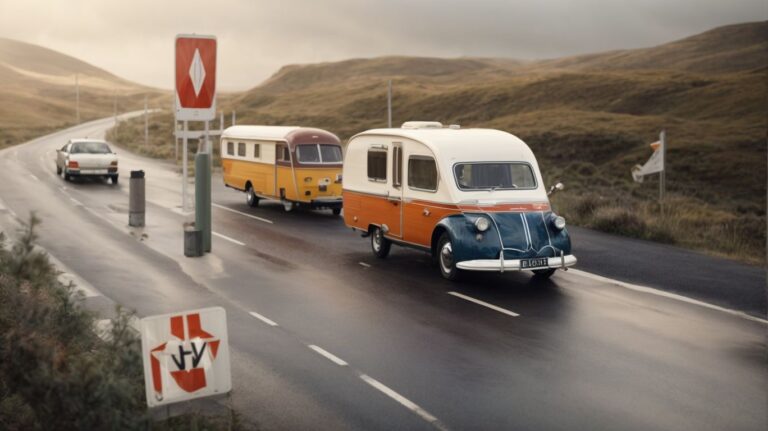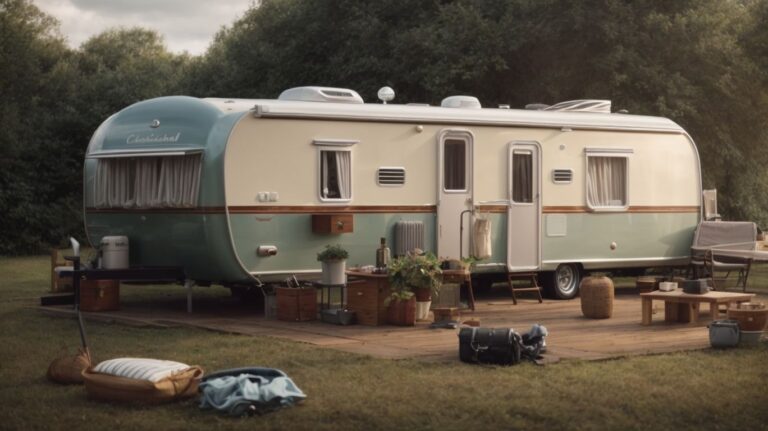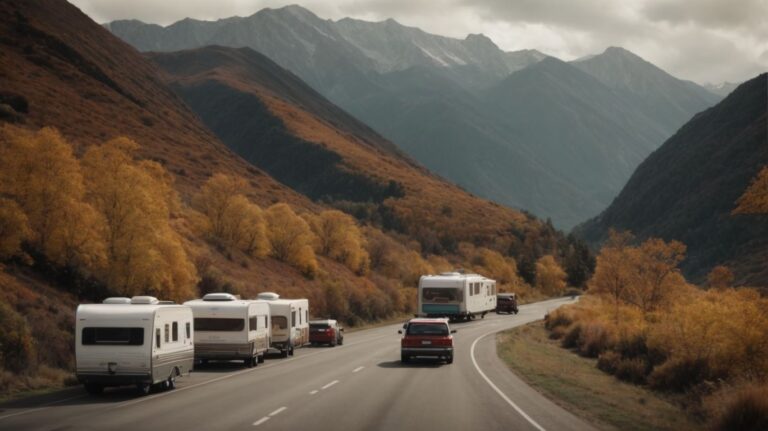Is It Safe to Tow a Caravan Without Mirrors? Tips for Safe Towing
Towing a caravan can be a convenient and enjoyable way to travel, but it also comes with its own set of legal requirements and safety considerations.
One key question that often arises is whether mirrors are necessary when towing a caravan.
We will explore the legal requirements for towing a caravan, the importance of having mirrors, how to properly install and adjust towing mirrors, as well as tips for safe towing without mirrors.
We will also discuss the risks of towing a caravan without mirrors, such as limited visibility, difficulty in maneuvering, increased risk of accidents, and potential legal consequences.
If you’re planning to hit the road with a caravan in tow, read on to ensure a safe and smooth journey ahead.
Key Takeaways:
What Are the Legal Requirements for Towing a Caravan?
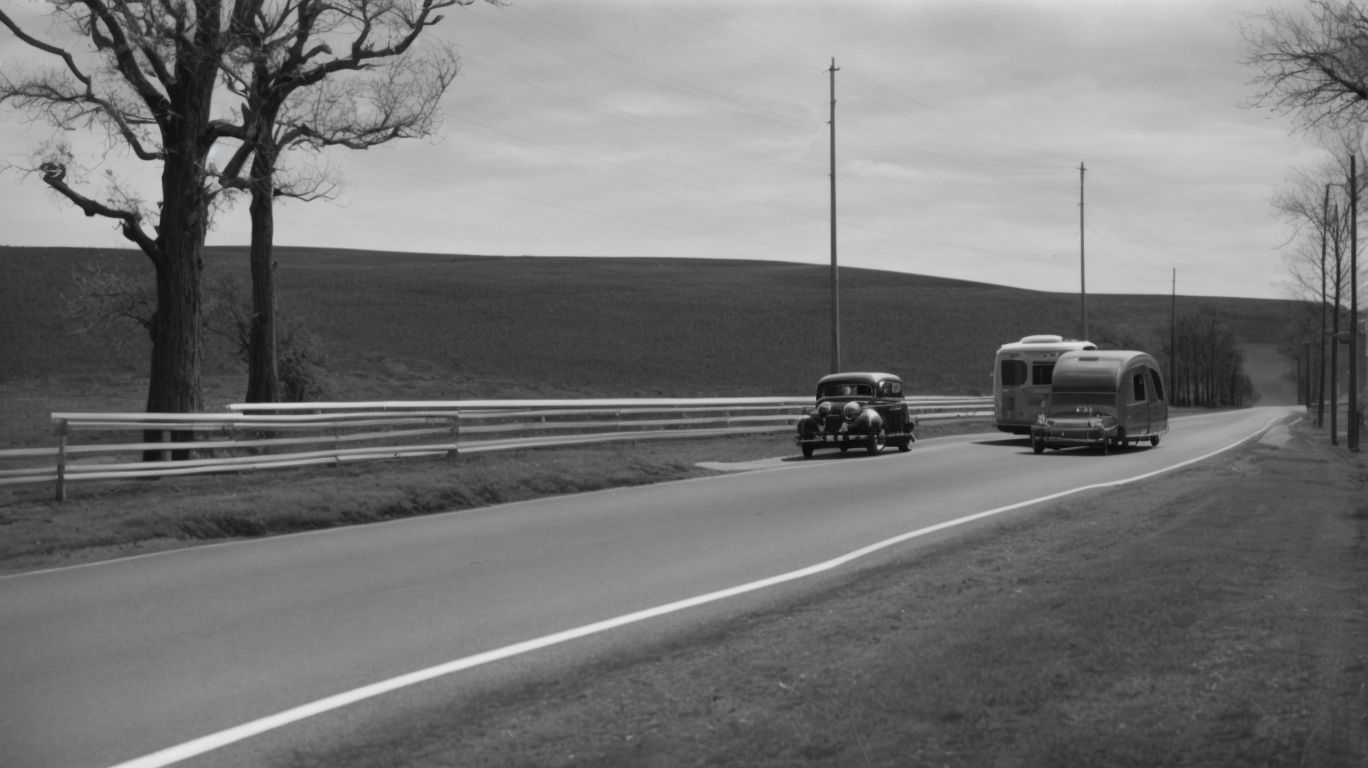
Credits: Motorcaravanning.Com – Sean Jackson
Understanding the legal requirements for towing a caravan is essential to ensure compliance with state laws and regulations. It involves adhering to specific guidelines regarding the use of towing mirrors, trailers, and the vehicle being used for towing.
State laws vary when it comes to towing caravans, with each jurisdiction having its specific regulations. For example, some states mandate the use of towing mirrors when the width of the caravan exceeds a certain measurement. Ignoring these regulations can result in fines or penalties.
Ensuring that the trailer being towed meets vehicle safety standards is crucial for road safety. Regular maintenance checks on the towing vehicle, such as brake inspections and tire pressure monitoring, are also essential to prevent accidents and ensure compliance with legal requirements.
Do You Need Mirrors When Towing a Caravan?
Having proper mirrors when towing a caravan is crucial for maintaining a clear view of the road and ensuring safe driving practices.
Installing towing mirrors on your vehicle expands your field of vision, allowing you to see beyond the back of your caravan. This enhanced visibility is essential when changing lanes, merging onto highways, or maneuvering through tight spaces.
Not only do towing mirrors improve safety by reducing blind spots, but they also help you comply with legal requirements, ensuring that you meet regulations regarding rear view visibility while towing. This is especially important for avoiding accidents and preventing potential traffic violations.
What Are the Other Requirements for Towing a Caravan?
Apart from mirrors, towing a caravan involves meeting various other requirements such as complying with trailer laws, ensuring distances are maintained, and being aware of additional mirror regulations.
Trailer laws dictate the specifications and standards that all trailers, including caravans, must adhere to for safe towing. It is crucial to understand the legal requirements around trailer weight limits, brake systems, and lighting. Enforcement officers are tasked with ensuring that these laws are followed, and failure to comply can result in fines or penalties.
Along with trailer laws, drivers must also be mindful of the required distances between vehicles when towing a caravan, keeping a safe gap to allow for proper braking and maneuvering.
The use of additional mirrors is often mandatory when towing wide loads like caravans. These mirrors provide better visibility for the driver, especially when changing lanes or reversing. It is essential to install and adjust these mirrors correctly to eliminate blind spots and enhance overall safety on the road.
Why Is It Important to Have Mirrors When Towing a Caravan?
The presence of mirrors when towing a caravan is essential as it enables the driver to have a clear view of the road behind, enhancing safety and driving confidence.
Towing mirrors play a crucial role in expanding the driver’s field of vision, allowing them to see more than they could with just the standard rearview mirror. This additional visibility is particularly beneficial when changing lanes, making turns, or reversing, reducing blind spots and potential risks on the road.
Using towing mirrors also aids in maneuvering the caravan smoothly by providing a better perspective of its surroundings, making it easier to navigate through tight spaces or crowded areas safely and efficiently.
Towing mirrors complement other assistance technologies like rear view cameras, offering a comprehensive solution for seeing behind the caravan and ensuring a safer journey for both the driver and other road users.
How to Properly Install and Adjust Towing Mirrors
Proper installation and adjustment of towing mirrors are crucial for ensuring optimal visibility and functionality while towing a caravan.
When installing side mirrors for towing purposes, it is essential to ensure a secure and tight fit to prevent any unnecessary vibrations or movements while driving. Start by carefully removing any existing mirrors and following the manufacturer’s guidelines on attaching the towing mirrors securely to the vehicle. Alignment is key for proper functionality – make sure the towing mirrors are set up in a way that complements the primary mirrors without obstructing the driver’s view.
If your vehicle requires additional mirror sets for enhanced towing visibility, consider investing in adjustable mirror extensions or wider mirrors. These supplementary mirrors can offer a wider range of vision and better coverage, especially when towing larger trailers or caravans. Remember to make necessary mirror adjustments to eliminate blind spots and ensure clear visibility of the surrounding traffic.
What Type of Towing Mirrors Should You Use?
Choosing the best type of towing mirrors is crucial for ensuring a secure fit, optimal visibility, and potential upgrades that may offer additional features such as integrated cameras.
Regarding towing mirrors, there are several options available to cater to different needs. One popular choice is the clip-on mirrors, which attach to the existing side mirrors for extended visibility. These are convenient and easily removable when not needed.
On the other hand, full-replacement towing mirrors offer a seamless look and enhanced visibility, replacing the factory mirrors entirely for a perfect fit. For those looking for advanced features, mirrors with integrated cameras provide not only improved visibility but also added safety and convenience for towing trailers and RVs.
How to Install Towing Mirrors on Your Vehicle?
Installing towing mirrors on their vehicle involves purchasing the right set of mirrors, securely hooking them up, and making necessary adjustments to ensure proper alignment and functionality.
When selecting towing mirrors, consider options like slide-on or clip-on types that fit your vehicle’s make and model. Ensure they provide a clear view of the rear and side of the vehicle when towing trailers or campers for added safety.
Before attaching the mirrors, clean the surface where they will be mounted to ensure a secure attachment. Most towing mirrors come with adjustable straps or screws that can be tightened to hold them firmly in place.
Once attached, adjust the mirrors to provide a wide view of the road behind, reducing blind spots. Test the visibility by sitting in the driver’s seat and making any necessary tweaks for optimal positioning.
How to Adjust Towing Mirrors for Optimal Visibility?
Ensuring that your towing mirrors are correctly adjusted is vital for maintaining a level position, optimizing visibility, and obtaining a clear view of the road behind while driving.
Proper mirror adjustment involves a few simple yet crucial steps. Ensure that the mirrors are aligned parallel to your vehicle. A common method is to position your head against the driver’s window and adjust the mirror outward until you can barely see the side of the car. Adjust the angle to provide the best view of the road behind you without obstructing the view of the road ahead. Check for any blind spots and make further adjustments to eliminate them, enhancing your overall road visibility.
What Are the Tips for Safe Towing Without Mirrors?
While towing without mirrors is not recommended, there are certain tips and techniques that can enhance safety, including leveraging other forms of vision technology and driving strategies to compensate for the lack of mirrors.
One way to improve visibility when towing without mirrors is to utilize advanced driving strategies such as adjusting your seating position to increase your range of vision. Additionally, installing backup cameras can drastically improve your ability to see behind you while towing. Regularly checking blind spots and using wide-angle mirrors can provide additional visual aid during lane changes and turns.
Practice Proper Loading and Weight Distribution
Proper loading and weight distribution in the trailer are essential factors for maintaining stability, control, and safe driving practices, ensuring a safe journey for trailer owners and other road users.
Regarding the weight distribution within a trailer, it’s crucial to evenly disperse the load to prevent swaying or fishtailing. An unbalanced trailer can lead to dangerous driving conditions, such as reduced steering control and increased risk of accidents. By properly balancing loads and avoiding overloading, trailer owners can significantly enhance the safety of their journey.
Drive Slowly and Carefully
Driving slowly and attentively when towing a caravan is crucial for maintaining control, reacting to road conditions, and ensuring a safe distance from other vehicles.
When towing, it is essential to adjust your speed according to the weight and size of the caravan. It’s important to remember that heavier loads require more time to stop, so driving at a moderate speed is recommended.
Additionally, maintaining a safe distance from the vehicle in front of you becomes even more critical while towing. The increased weight and length of your caravan can affect your ability to react quickly to sudden stops or obstacles on the road.
Being aware of your surroundings and anticipating potential hazards are key aspects of road awareness when towing. Take note of road signs, be prepared for changing weather conditions, and always keep an eye out for unexpected challenges that may come your way.
Use Your Side Mirrors Effectively
Effectively utilizing your side mirrors while towing a caravan can significantly enhance your view of the surroundings, enabling better rear visibility and safer driving maneuvers.
When towing, adjust your side mirrors to cover blind spots and ensure you can see the rear of your caravan. This will help you monitor other vehicles around you and plan lane changes more effectively. Regularly checking your side mirrors while driving can enhance your overall road awareness and improve your ability to react to unexpected situations. Remember, proper mirror usage is key to a smooth and safe towing experience.
Make Use of Technology
Leveraging technological advancements such as backup cameras can offer additional visibility and aid in seeing behind the caravan, enhancing safety and maneuvering capabilities.
These innovative camera technologies play a crucial role in providing the driver with clear views of what’s happening behind the vehicle, eliminating blind spots and potential hazards. By displaying a live feed of the rear view, backup cameras contribute significantly to preventing accidents and ensuring a smooth towing experience. The enhanced visibility allows for easier navigation in tight spaces, making backing up and parking the caravan much more manageable.
What Are the Risks of Towing a Caravan Without Mirrors?
Towing a caravan without proper mirrors poses significant risks such as limited visibility, challenges in maneuvering, increased accident probabilities, and potential legal repercussions.
Proper mirrors play a crucial role in ensuring that the driver has a clear view of what is happening behind the caravan, including any vehicles attempting to overtake or maneuver around it. Without adequate mirrors, the driver’s blind spots increase, leading to potential collisions or road accidents.
Maneuvering a caravan without proper mirrors can be extremely challenging, especially when changing lanes, reversing, or navigating through tight spaces. The lack of visibility can result in misjudgments of distances and angles, making it harder to avoid obstacles and obstacles in the road.
From a legal perspective, most regions have specific laws mandating the use of appropriate mirrors when towing a caravan. Failure to comply with these regulations can not only result in fines and penalties but also potentially invalidate insurance coverage in case of an accident.
Limited Visibility
Limited visibility due to the absence of proper mirrors can lead to blind spots, obstructed views of the rear, and challenges in monitoring the road behind the caravan.
These limitations pose significant risks in towing safety, as drivers may struggle to detect vehicles in adjacent lanes or accurately judge distances when changing lanes. The lack of rear visibility can also make it harder to anticipate and react to sudden stops or obstacles on the road. To address these issues, ensuring mirror effectiveness and utilizing advanced rear monitoring technology such as backup cameras can greatly enhance the driver’s ability to navigate safely. Clear views not only promote safer towing practices but also contribute to overall road safety for all motorists.
Difficulty in Maneuvering
The absence of proper mirrors can result in challenges when maneuvering a caravan, impacting driving control, lane changes, and overall road navigation.
When drivers lack adequate mirrors on their caravan, it becomes significantly harder to maintain control over this bulky vehicle. Maneuvering such a large load becomes even riskier without the ability to observe blind spots. Lane changes, a routine part of highway driving, pose a particularly high risk without proper mirrors, increasing the likelihood of accidents and close calls. Clear visibility is the cornerstone of safe road travel, and without it, the driver’s ability to navigate effectively is severely compromised.
Increased Risk of Accidents
The absence of proper mirrors while towing increases the likelihood of accidents, collisions, and road incidents due to compromised visibility and limited monitoring capabilities.
When towing a caravan, having adequate mirrors is essential for maintaining visibility of surrounding vehicles and potential obstacles. Not having proper mirrors can lead to blind spots, resulting in dangerous lane changes, merging difficulties, and increased chances of collisions.
Inadequate mirrors also pose a significant safety hazard to both the driver of the towing vehicle and other road users. Reduced visibility can make it challenging to assess distance and judge the speed of nearby vehicles, amplifying the risk of rear-end collisions or side-swipe accidents.
Compromised visibility can hinder the driver’s ability to safely navigate tight spaces, make turns, or park the vehicle, further escalating the potential for road incidents and automotive mishaps.
Legal Consequences
Operating a caravan without proper mirrors can lead to legal consequences such as fines, penalties, and citations from law enforcement officers for non-compliance with safety regulations and towing laws.
When a caravan lacks adequate mirrors, it not only compromises safety on the road but also opens the door to potential legal liabilities. In many jurisdictions, towing laws stipulate the necessity of proper mirrors to ensure clear visibility and safe operation. Failure to comply with these regulations could result in hefty fines, penalties, or citations being issued by authorities for violations. These enforcement actions serve as a reminder of the importance of adhering to safety standards and legal requirements when towing vehicles to prevent any legal repercussions from arising.
Frequently Asked Questions
Is it safe to tow a caravan without mirrors?
It is not recommended to tow a caravan without mirrors, as they are essential for safe and legal towing.
Why are mirrors necessary when towing a caravan?
Mirrors give you a wider field of vision, allowing you to see any vehicles or obstacles around your caravan. They also help you maintain better control of your vehicle while towing.
What type of mirrors should I use when towing a caravan?
It is recommended to use extended mirrors that provide a wider view, specifically designed for towing purposes. Clip-on mirrors are also available for easier installation.
What are some tips for safe towing with mirrors?
Always make sure your mirrors are properly adjusted before setting off and check them regularly during your journey. Also, avoid relying solely on your vehicle’s side mirrors and invest in an additional rearview mirror for better visibility.
Is it a legal requirement to have mirrors when towing a caravan?
Yes, it is a legal requirement in most countries to have functional mirrors when towing a caravan. Failure to comply can result in fines or penalties.
Can I use my regular car mirrors for towing a caravan?
No, it is not recommended to use your regular car mirrors when towing a caravan. They may not provide enough visibility and may also cause damage to your car’s original mirrors.


